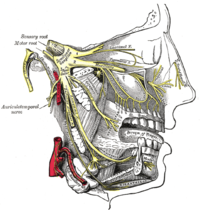
Photo from wikipedia
A 57-year-old woman was referred to an orofacial pain specialist due to a 4-year history of undiagnosed, chronic pain in the temporomandibular joint (TMJ). She reported alterations in her jaw… Click to show full abstract
A 57-year-old woman was referred to an orofacial pain specialist due to a 4-year history of undiagnosed, chronic pain in the temporomandibular joint (TMJ). She reported alterations in her jaw position associated with marked-to-severe left preauricular pain and masticatory muscle pain (masseter and temporalis). The pain symptoms were described as sharp and stabbing with the patient self-rating her pain at 7 (visual analogue scale 0–10). Symptom triggers included prolonged talking, stress and left-sided chewing. The patient’s medical, family and social history were noncontributory and a history of craniofacial trauma was denied. In addition, no complaints or symptoms were noted in other joints. Radiographic examination using cone beam computed tomography (CBCT) showed minimal change on the mandibular condyle and temporal fossa at initial presentation (Fig. 1). Magnetic resonance imaging (MRI) revealed normal TMJ disc morphology and position. Treatment included physical therapy, occlusal splint prosthesis, muscle relaxants and arthrocentesis with corticosteroids and lidocaine, none of which provided pain relief. Referral was made to a rheumatologist where MRI and radiographic examination of major joints in addition to hands and TMJ revealed normal findings. The following laboratory tests, complete blood counts (CBC), comprehensive metabolic panels, erythrocyte sedimentation rate (ESR), rheumatoid factor (RF) and anti-cyclic citrullinated peptide antibodies, were all within normal ranges. Anti-nuclear antibody (ANA) levels were elevated at 1 : 160 with negative anti-double-stranded DNA, anti-Sj€ ogren’s syndrome B (antiSSB)/La, anti-Smith, anti-ribonucleoprotein with an equivocal anti-SSA/Ro. The rheumatologist’s initial assessment included:
Journal Title: International Journal of Rheumatic Diseases
Year Published: 2017
Link to full text (if available)
Share on Social Media: Sign Up to like & get
recommendations!